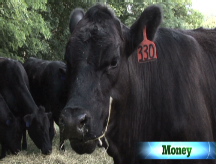One family: In search of a simpler life
The Gunns ditched the corporate world for the family farm. They love their new life, but did it simplify their finances? Not by a long shot.
 |
| Raising cattle is the main event for Kathy and Josh Gunn. But raising their girls - Morgan, Anna and Katie - is what matters most to them. |
| MMA | 0.69% |
| $10K MMA | 0.42% |
| 6 month CD | 0.94% |
| 1 yr CD | 1.49% |
| 5 yr CD | 1.93% |
(Money Magazine) -- Five years ago, Kathy and Josh Gunn were typical urban professionals. Kathy started her day at 5 a.m. to get in a session with her personal trainer before heading to the office, where she put in 60 hours a week as an executive at a consumer electronics company. Josh traveled four days a week as a crop systems specialist for John Deere.
The couple lived in a hip neighborhood in downtown Atlanta, within walking distance of shops, theaters, music clubs and restaurants. Most Friday nights they'd hit their favorite dinner spot: a tiny Italian eatery with live music and a great wine list where they routinely ran up bills of $100 or more - not even a blip in their budget on their combined salary of nearly $200,000 a year.
But that was then and this is now. These days Josh, 33, confines his travels to the surrounding 1,500 acres - the sprawling expanse of Green Hill Farms, the Gunn family cattle farm 45 miles north of Nashville where he and Kathy, 38, live with their daughters Morgan, 5, Anna, 2, and Katie, 1.
Josh spends his days feeding the animals, mending fences and doing other chores involved in running a farm, while Kathy puts in 30 hours a week as a consultant at a local bank. She still gets up early but only to drop the girls off with their youth minister's wife, who looks after them while she works.
By 3 p.m. she's back at the farmhouse they share with Josh's grandmother. And when they eat out, it's likely to literally be out - at the picnic table in their backyard, with four generations of Gunns sharing the meal.
Like so many corporate types who dream about chucking it all for a mellow life in the country, Kathy and Josh had talked for years about moving to the family farm. Only problem: The simple life they envisioned isn't turning out quite as they planned.
Yes, Josh loves working the land. "It's hard work and exhausting but I get pleasure in what I do every day," he says. And Kathy loves raising their girls close to nature and their extended families.
But between the demands of the farm and a gourmet beef business they've launched as a sideline, the Gunns are working seven days a week from morning till dusk, close to the 24/7 description associated with high-pressure city jobs. Notes Kathy, wryly: "It's not exactly a relaxed life."
But the greatest challenges they face are financial. Commodity prices may be soaring, but farming is still a tough way to make a living. Most family farms rely on other sources of income to survive, and the Gunns are no exception.
Yet even with Kathy's job and their sideline business, the couple make only about a third of what they earned in Atlanta; they can pay their basic bills but not much else.
An emergency like the furnace breaking down means a scramble for cash. The farmhouse needs repair - a new air-conditioning system, for starters - but the Gunns can't afford it. They haven't taken a vacation in five years. And they've stopped saving for college and retirement entirely. "We're big savers and not used to living paycheck to paycheck," says Kathy.
Also weighing on the couple is their uncertainty about what will happen to the farm - and their livelihood - once Josh's parents are no longer around. Josh has a 25% partnership stake in the farm's operations that will gradually increase until he takes over the business when his father retires.
But ownership of the land, now worth about $3 million, is separate from the business, and Josh and Kathy don't know what his parents plan do with it. The elder Gunns might well divide the property equally between Josh and his two siblings. If either one wants to sell, Kathy and Josh couldn't afford to buy that share - then what would they do? Yet they don't feel comfortable simply asking the older couple what their intentions are. "The subject is a little taboo here," says Kathy.
Trading in city life for the country was no Green Acres fantasy for the Gunns. Josh grew up on the farm - he is the sixth-generation Gunn to work the land - and left only to go to college when he was 18.
After earning a degree in agricultural economics from the University of Tennessee (UT), however, he opted to work for big agricultural companies, training farmers in new products and technology, rather than return home. He enjoyed the work but was intent on going back to Green Hill one day, eager to apply the knowledge he'd gained counseling other farmers.
Kathy, though, had always been a city girl. She grew up in Knoxville, the daughter of a UT college professor and a stay-at-home mom. As a girl she dreamed of living in an even bigger city and working in a "tall glass tower," which is just what she did once she earned her business degree from UT.
She got a job at Philips Consumer Electronics in Knoxville, then moved with the company to Atlanta in 1996, rising through the sales ranks to become director of business intelligence.
When she met Josh through an online dating service in 1999, they clicked right away. Both had roots in Tennessee, loved UT football and wore No. 16 on their soccer jersey. They married the next year, bought a small house in downtown Atlanta and settled in to enjoy the conveniences of city life.
But when they visited Josh's family on the farm, Kathy began to envision living there, just as her husband always dreamed of moving back. "Josh was a different person on the farm - happier, more content," says Kathy. She also liked the idea of being closer to their families once they had children of their own.
The Gunns didn't kid themselves. They knew it would be tough to make a good living on the farm, so they set out to build a cash cushion, saving as aggressively as possible while they were both earning healthy salaries. They maxed out their 401(k)s, amassing more than $300,000. They socked away another $1,000 a month in a brokerage account. They even set aside $25,000 for their children's college funds - before they had any kids.
When Kathy got pregnant in 2002, she and Josh decided the time was right to return to Tennessee. The idea was for Josh to work with his dad David, 58, helping to manage the farm's cattle operation and start a custom-grazing business (raising cattle for other owners) and eventually taking over the business.
Kathy worked out a deal with her employer to work remotely, enabling her to keep her job and her six-figure salary. They put their house in Atlanta on the market and bought a $220,000, three-bedroom home in Springfield (pop. 16,000), 10 miles from the farm.
Between their savings, Kathy's salary and a lower cost of living, they figured, they could easily handle the drop in Josh's income.
Send feedback to Money Magazine



